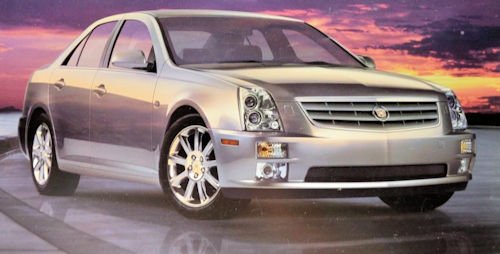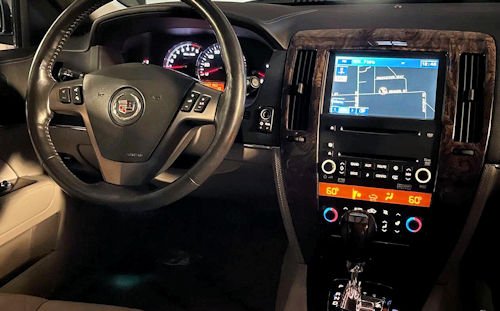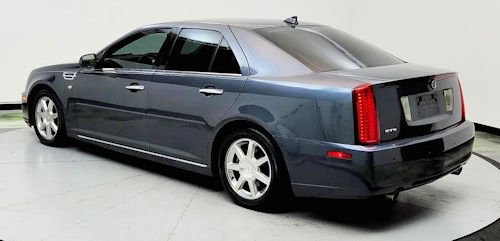Cadillac STS
 |
|
|
Manufacturer |
General Motors |
|
Production |
2004–2011 |
|
Assembly |
United States, China, Russia |
|
Class |
luxury car |
|
Body style |
4-door sedan |
|
Layout |
Front-engine, Rear wheel drive / Front-engine, four-wheel drive |
|
Platform |
GM Sigma/GMX295 |
|
Engine |
2.0 L LDK I4 |
|
Transmission |
|
|
Wheelbase |
116.4 in (2,957 mm) (STS SWB) |
|
Length |
2005–2007: 196.3 in (4,986 mm) |
|
Width |
72.6 in (1,844 mm) |
|
Height |
57.6 in (1,463 mm) (STS SWB) |
|
Curb weight |
3,922 lb – 4,255 lb (1,905–1,930 kg) |
The Cadillac STS is a luxury-class vehicle produced by Cadillac between fall 2004 and mid-2011.
History
The STS replaced in autumn 2004 the model Seville . The name originally stood for Seville Touring Sedan and Sport Touring Sedan . This followed the new Cadillac nomenclature, which provides only abbreviations as a model name. Like the first-generation CTS , GM built it on the sigma platform. Unlike the old Seville STS should act more sporty in its new form. With an overall length of 4985 mm, a wheelbase of 2957 mm and front/rear track of 1596/1581 mm, the STS is the largest saloon in the Cadillac portfolio.Technical features include a Keyless Access system with a push button start; Adaptive Cruise Control (ACC); and reconfigurable four-colour head-up Display (HUD) on the 4.6-litre V8; plus heated & ventilated seats and heated steering wheel.
In the US market, a new make of the STS cost $ 47,495. In the Chinese market a version of the STS was 100 mm longer wheelbase under the name Cadillac SLS.
The STS is offered with the 257 hp (189 kW) 3.6-litre V6 VVT or the 325 hp (239 kW) Northstar 4.6-litre V8. Both engines incorporate variable valve timing (VVT) and are mated to Cadillac’s widely acclaimed five-speed automatic transmissions. Four-cam variable valve timing gives the V6 engine increased efficiency, with benefits in fuel economy, reduced emissions and engine flexibility. the 3.6-litre V6’s peak torque is available across a broad operating range: from 1600 rpm to 5800 rpm.
The engines used for the STS initially a 4.6 -l Northstar V8 engine, which brought it to a maximum power of 239 kW (325 hp) and a 3.6 -liter V6 engine with 189 kW (257 hp ). In Europe, the STS represented the top model of Cadillac within the luxury class , while in the US, the role of the DTS was given.
The 4.6-litre Northstar engine delivers 0-62 mph acceleration in 6.2 seconds. With the V6 the STS achieves 0-62 mph in 7.4 seconds.
The STS-V , which has a 4.4-liter V8 engine with 345 kW (469 hp) of maximum power, was refilled shortly after its introduction.

the STS is highly specified as standard, with Tuscany full leather upholstery; eight-way power seat adjustments for the driver and front passenger including a memory package which provides presets for two drivers and automatically adjusts the outside rear-view mirrors; power tilt and telescoping steering wheel position; steering wheel controls for the sound system; and voice recognition. The STS also has a tyre pressure monitoring system, power boot release and rear parking assist, which includes a rear-view LED display and audible warning.
Premium quality materials are used throughout. The interior choices include aluminium trim on both console and instrument panel on the Elegance and two colour choices for wood trim as standard on the Sport Luxury. Dual-firmness leather seats are specially tanned for a softer feel. Natural grained surfaces on the doors and instrument panel the headliner and interior pillar trims, which are soft backed and covered with a Monaco woven fabric.
Additional refinements on the STS include the eucalyptus wood trim package, heated/ventilated front seats, heated steering wheel, power lumbar adjustment on both front seats and a top-of-the-range infotainment system, with a 15-speaker Bose 5.1 Surround Sound system and an integrated six-disc CD/DVD changer, a 203 mm (eight inch) VGA quality touch screen, Bluetooth capability, advanced voice recognition and an advanced navigation system.
Integrated chassis control technologies combine performance with a comfortable ride and include two-mode Magnetic Ride Control with ‘Performance’ or ‘Touring’ selections as standard on the V8. The electronically controlled magnetic-fluid-based real time damping used on STS.The standard StabiliTrak stability control system increases driving safety in high-speed swerves or sudden avoidance manoeuvres. Adapted from the driving dynamics system in the Corvette, the system is highly responsive and can adjust braking at any of the four wheels to maintain vehicle control. StabiliTrak is fully integrated with the traction control and ABS systems.
In autumn 2007, a facelift was made on the STS for the 2008 model year , which included a modified grille, a new rear bumper and a revised interior, as well as new features (such as lane change assistant and a lane departure warning ); The 3.6-liter V6 engine now had a maximum output of 222 kW and direct injection .Formally, the facelift on the NYIAS 2007 was presented In addition, there was from October 2009 to the 2010 model year a new 3.6-liter V6 engine, which now made a maximum of 225 kW.
Beginning of May 2011 the last STS rolled off the line. In spring 2012, the XTS was presented, replacing both the STS and the DTS.
Features
Head-Up Display (HUD) and Adaptive Cruise Control (ACC)
The head-up display (HUD) projects key driving information on to the windscreen. In addition to speedometer and turn signal indicators, the HUD shows audio system data, gear indication, and ACC settings in the driver’s natural line of sight.
Adaptive Cruise Control (ACC) combined with the head-up display, represents a crucial contribution to active safety. A radar sensor at the front of the Cadillac STS constantly monitors the traffic ahead. When the cruise control is engaged, the radar beam can detect when another vehicle is in the same lane and the car is automatically slowed down and maintains a gap pre-configured by the driver. If there is a stationary object ahead, the ACC system sounds an alarm and displays a warning signal for the driver in the windscreen HUD.

Technical
-
3.6 V6 Engine and Transmission
Engine type - 60-degree 3.6 V6 VVT (variable valve timing)
Block/cylinder heads - Cast aluminium/ semi-permanent mold aluminium
Bore x stroke (mm) - 94 x 85.6
Displacement (cm ) - 3564
Compression ratio ( : 1) -10.2
Fuel delivery - Returnless sequential fuel injection
Valvetrain - Roller follower DOHC, 4 valves per cylinder, continuously variable inlet and exhaust cam phasing
Ignition system - Coil-on-plug with extended-life dual platinum-tipped spark plugs
Peak output (hp/kW/rpm) - 257/189/6500
Peak torque (Nm/rpm) - 342/3200
Engine oil (l) - 4.7
Emissions controls
Evaporative system, close-coupled catalytic converters, positive crankcase ventilation, inlet and
exhaust cam phasers, electronic throttle control feedback air-fuel-ratio control
Transmission
Hydra-Matic 5L40-E 5-speed electronically-controlled automatic with lockup torque converter, Driver Shift Control, and Performance Algorithm LiftfootGear ratios
1st 3.42
2nd 2.21
3rd 1.60
4th 1.00
5th 0.75
Reverse 3.02
Final drive ratio 3.42Brakes
Vacuum power-assisted with anti- lock control and Panic Brake Assist, high
performance brake liningsTop speed (km/h) - 229
Acceleration 0-100 km/h (sec.) 7.4
Fuel economy (1/100 km, urban/extra-urban/combined) -17.7/9.4/12.4
C02 emission, combined (g/ 100 km) 295
Emission class Euro 4
Chassis / Suspension
Front axle - Independent, short/long arm, coil-over shock, anti-roll bar
Rear axle - Independent, modified multi-link, coil springs, automatic load leveling shock absorbers, anti-roll barSteering - Power-assisted rack and pinion; ZF
Turning circle, curb-to-curb (m) - 11.5
Wheels, front/rear - 7,5 x 17-inch/8 x 17 inch
Tires, front/rear - Michelin V-rated, 235/50R17 and 255/45R17Engine comparison
model
3.6 V6
4.6 V8
engine type
V6
V8
Displacement, cm³
3564
4565
Max. Power, kW (hp)
189 (257) at 6500
239 (325) at 6400
Max. Torque, Nm
342 at 3200
427 at 4400
Top speed, km / h
229
250
Acceleration, 0-100 km / h
7.4 s
6.2 s
Gearbox, standard
5-speed automatic transmission
Fuel consumption, combined, l / 100 km
12.4
14.4
Carbon dioxide emissionsm, g / km
295
343
Tank contents, l
66
-Note: More Specifications and Repair Manuals available for registered users-
